Emergency Dentistry – Rochester, MN
Get Out of
Tooth Pain Fast!

If you’re experiencing a severe oral injury or significant pain, don’t wait – contact Zumbro Family Dental right away for assistance and guidance. Time is often of the essence in these situations, which is why we’ll do our best to see your case on the same day as your initial call. We can provide emergency dentistry in Rochester, MN for a variety of common dental emergency situations, including broken teeth, dislodged teeth, lost fillings and crowns, uncomfortable toothaches, and more. If you suspect that your jaw is broken or you’re experiencing severe bleeding that isn’t letting up, go straight to your emergency room and contact our dental office later on for assistance with rebuilding lost and/or broken teeth.
Why Choose Zumbro Family Dental for Emergency Dentistry?
- Same Day Emergency Assistance
- State of the Art Dental Technology
- Comprehensive Dental Care in One Location
How We Treat Dental Emergencies
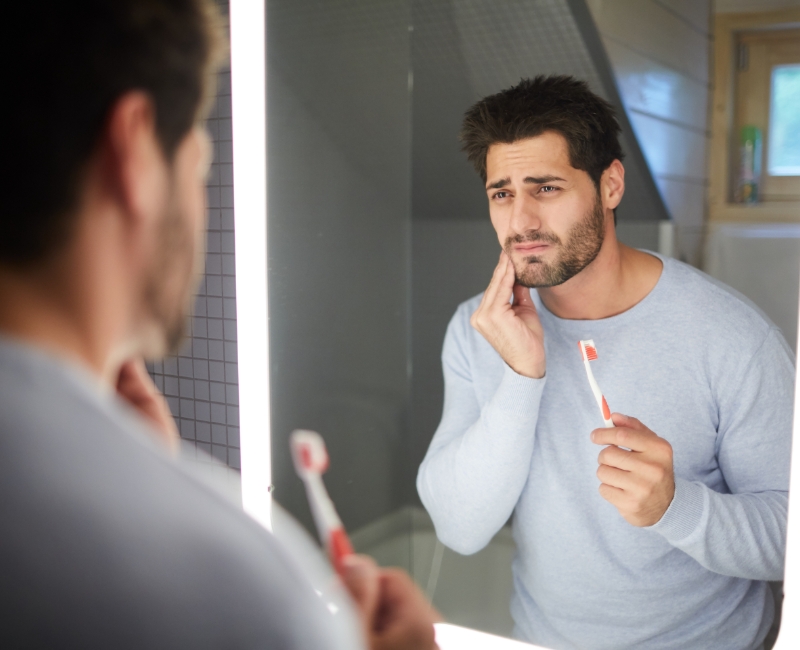
Before you begin addressing any dental emergency, it’s important that you contact our dental office directly and speak with an available team member. This way, you can schedule an appointment, ideally for the same day, and we can provide you advice for your issue. Until then, here’s what you should do before your emergency appointment.
The Most Common Dental Emergencies
No single description can capture every possible dental emergency, although they are usually characterized by pain or notable damage to the teeth and/or gums. If you notice any of the symptoms below, call us immediately for assistance; even if immediate care isn’t required, it’s always better to treat potential dental problems sooner instead of later.
Understanding the Cost of Emergency Dentistry

If you have a dental emergency, the last thing you should be worried about is how you're going to pay the bill. Many factors affect the cost of emergency dentistry in Rochester, but we offer several financial solutions to keep it affordable. We will get you into the office and address your pain before creating a treatment plan that accommodates your budget.
Every Dental Emergency is Different
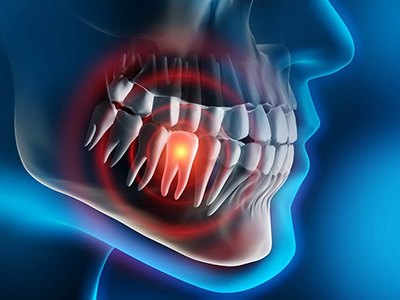
There's no flat fee for emergency dentistry because every situation differs. Therefore, many things will affect the amount you'll pay. Besides your consultation and diagnostic services, common procedures used for urgent situations include:
- Tooth Extraction
- Root Canal Therapy
- Dental Restorations
- Gum Disease Therapy
- TMJ Treatment
Your emergency dentist will create a personalized treatment plan. A member of our office will review your estimate, so you will know exactly what you'll need to pay before committing to anything.
Does Dental Insurance Cover Dental Emergencies?

Most dental insurance will cover 1-2 emergency visits per year. You can use your coverage to see an emergency dentist in Rochester to lower the amount you will pay out-of-pocket. For a co-payment, your insurance may cover your consultation and diagnostic services, including X-rays. They may cover 50% to 80% of the expenses of medically necessary treatments after meeting your annual deductible. You can use your yearly allowance to get the care you need without spending your life's savings. A member of our dental team will work on your behalf with your insurance to maximize any applicable coverage.
Other Options for Making Dental Emergencies Affordable
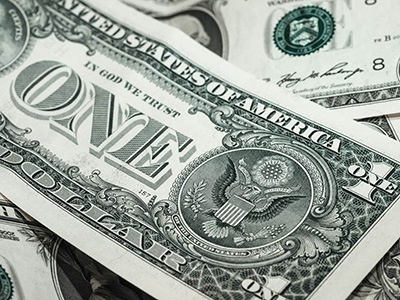
In addition to dental insurance, our office offers other solutions to keep emergency dentistry affordable, including:
- Traditional Payments: We accept all traditional payment methods, including cash, personal checks, and most credit cards.
- Financing: Based on your credit approval, you may be a candidate for little or no interest in financing. You can make monthly installments on any out-of-pocket expenses.
Taking Care Of Your Smile Can Save You Money

Although you can't always stop accidents from occurring, you can lessen your risk of a dental emergency through the power of prevention. Many dental emergencies are caused by untreated issues, like cavities. Good oral hygiene and regular dental cleanings will support healthy teeth and gums. Your dentist will also monitor your oral health to detect anything concerning promptly. Eat nutritious foods, limiting sugars and starches. Moderate your consumption of hard or chewy foods. Break any bad habits that may damage your teeth, like crunching ice or chewing on your fingernails. Don't forget to wear an athletic mouthguard if you play sports. Ask your dentist for a nightguard if you have a habit of grinding or clenching your teeth.
Keys to Preventing Dental Emergencies

Although it’s impossible to anticipate exactly when or how you might have a dental emergency, there are things you can do to preclude them. Proper preventative care can keep your teeth and gums in optimal condition so that they’re better able to resist damage, disease, and decay that might otherwise lead to an urgent situation.
Continue reading to learn about the proactive steps you can take to safeguard your smile and feel free to contact us for more information.
Schedule Regular Checkups
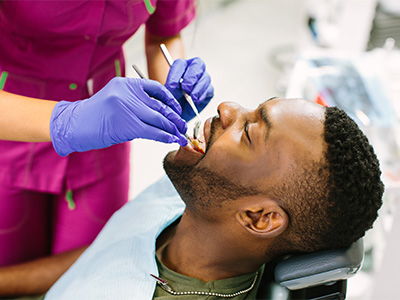
Even if you don’t have any immediate issues, you should schedule a routine checkup and cleaning with our team every six months. This allows us to monitor your dental condition and quickly spot any developing areas of concern. By catching them early, we can treat them before they progress into something worse, which can save both your oral health and your budget.
Standard examinations cost less than emergency therapies and can stop problems before they start. For example, if you have a cavity, we can fill it before it becomes infected and requires a more expensive root canal and dental crown.
Practice Consistent Oral Hygiene at Home

Germs in your mouth work in tandem with leftover bits of food to build plaque residue on your teeth and gumline. Unfortunately, this can cause decay and disease if it’s not regularly cleaned away. That’s why it’s imperative that you brush and floss twice daily, both morning and night. Removing buildup consistently gets rid of harmful bacteria so that your mouth is better able to resist injury or illness that can result in an urgent scenario.
Watch What You Eat

The adage “you are what you eat” is particularly pertinent when it comes to your smile. Overly sugary foods attract germs that work in tandem with acids from the foods you eat to wear down your enamel. This can cause tooth decay and gum disease, which can lead to an emergency down the road.
Eating a well-balanced diet gives your body all the nutrients it needs to function at its peak, including your mouth. Dairy products like milk and yogurt have plenty of calcium for strong teeth and bones, while citrus fruits are full of vitamin C to support your gums.
Wear a Mouthguard
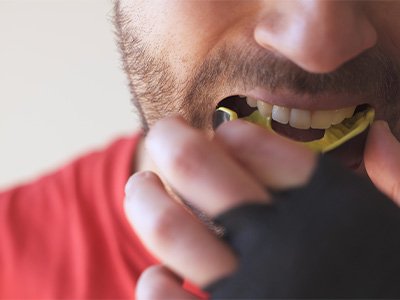
If you participate in martial arts, team sports, or other high-contact activities, then you’re prone to sustaining injuries that can hurt your dental health. One blow to the face can break a tooth beyond repair or dislodge it completely. Wearing a mouthguard, however, evenly distributes the force, so you’re less likely to fracture or lose anything.
Also, the constant pressure from bruxism, or chronic tooth grinding, can damage your grin. The added force of clenching your jaw together can crack your teeth. Thankfully, Dr. Brong can provide a customized nightguard to cushion them.
Don’t Use Teeth as Tools

When you’re in a hurry, you may feel tempted to open a package, bottle, or mailbox with your teeth. This isn’t their intended purpose, though, and you could harm one. It’s worth it to take a few extra seconds to locate an appropriate tool, such as scissors, a letter opener, or a box cutter.
Dental Emergency FAQs
Will my toothache go away on its own?
Toothaches usually don’t fade on their own. (Unless the pain comes from around the tooth, like gum irritation.) You need proper dental treatment to get rid of them. To that end, booking a checkup with your dentist is best for settling things.
You see, a toothache is likely to get worse if left alone. The factors that can cause one are often harmful to your long-term health. You’ll thus want to rule them out with your dentist at once. If nothing else, the visit will confirm nothing is wrong.
Should I visit the emergency room first for dental emergencies?
It might seem odd, but you’re better off skipping the emergency room for dental emergencies. Most ERs aren’t equipped to handle urgent oral care, as they lack the proper staff. At best, their doctors can only offer painkillers or antibiotics – things that wouldn’t solve your underlying issue. (The visit would also prove more expensive than seeing a dentist.)
That said, there are exceptions where an ER could be the better option. Issues where you’d need immediate medical attention include:
- Jaw fractures and dislocations
- Severe cuts or lacerations to the face and mouth
- An abscess or infection that’s swollen to the point of affecting breathing or swallowing
What does throbbing tooth pain mean?
If you have throbbing tooth pain, your pearly white is likely inflamed or infected. Therefore, seeing a dentist at once is in your best interest.
With tooth inflammation or infection, bacteria reach your tooth’s sensitive inner area – its pulp. The result is that they irritate dental nerves, which then send pain signals to your brain. Without treatment, though, this pain is the least of your worries – you could lose your tooth or worse!
Still, there are other possible causes for throbbing teeth. The issue could stem from tooth decay or chronic grinding and clenching. Even if the source isn’t an infection, however, you’ll still want to rule out the possibility with a dental visit.
How long can a restoration be temporarily attached?
If you have a crown that falls out, you can temporarily reattach it. That said, you should see a dentist for treatment as soon as possible. A crown will only remain stable for a few days. For that reason, you must get it replaced (or reattached) by a dentist. You should avoid chewing with the affected tooth until that time.
On the other hand, a filling can’t be placed back in a tooth at all. You’ll have to keep from using the pearly white while waiting for a new one.
I Need a Checkup & Cleaning I Need a Dentist for My Child I am Concerned About Bleeding Gums I Have a Cavity or Broken Tooth I am Missing One or More Teeth I Want to Enhance My Smile I Want a Straighter Smile I am Scared of the Dentist View Our Services





